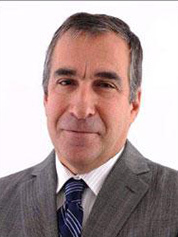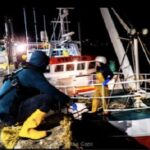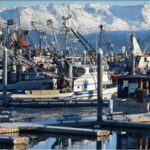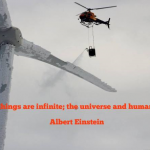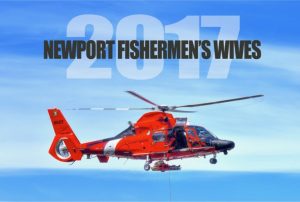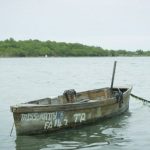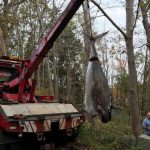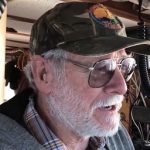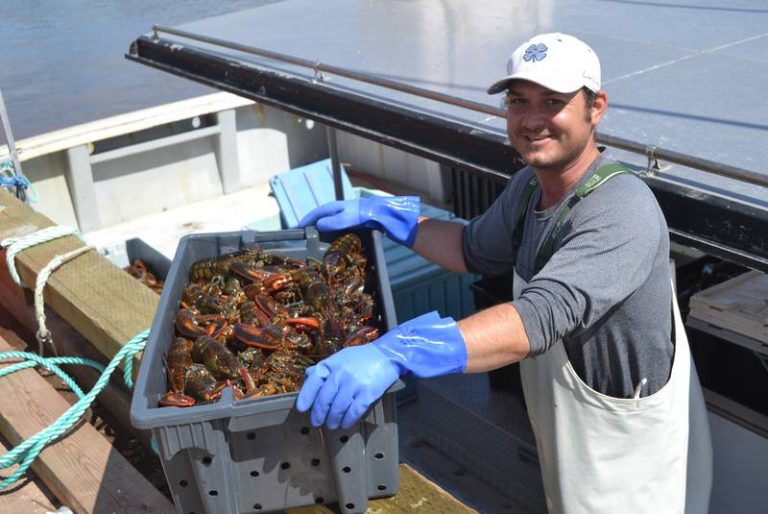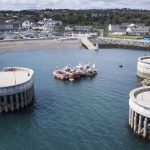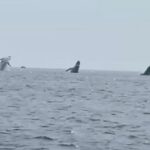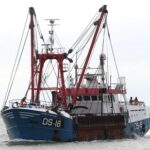Tag Archives: David Goethel

East Coast Fishermen File Lawsuit Over At-Sea Monitoring Mandate
WASHINGTON – Today, Cause of Action is announcing that its clients, David Goethel, owner and operator of F/V Ellen Diane, a 44-foot fishing trawler based in Hampton, N.H., and Northeast Fishery Sector 13, a nonprofit entity representing fishermen from Massachusetts to North Carolina, are suing the U.S. Department of Commerce over a program that would devastate the fishing industry along much of the eastern seaboard. Read the Press Release here 09:52
New Hampshire: NOAA monitoring fee will kill local fishing industry
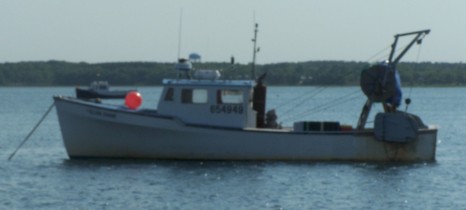 Local fishermen say the looming cost of paying $700 per day, for at-sea monitors, could put them out of business by the end of the year. It’s a threat that everyone should take seriously. “The day I really have to pay for this is the day I stop going fishing,” says David Goethel, a commercial fisherman from Hampton. “The airlines do not pay for the TSA, agribusiness does not pay for meat inspection, and pharmaceutical companies do not pay for the FDA, to name a few,” Goethel said. “These are considered functions of government and so is catch monitoring.” Read the rest here 08:40
Local fishermen say the looming cost of paying $700 per day, for at-sea monitors, could put them out of business by the end of the year. It’s a threat that everyone should take seriously. “The day I really have to pay for this is the day I stop going fishing,” says David Goethel, a commercial fisherman from Hampton. “The airlines do not pay for the TSA, agribusiness does not pay for meat inspection, and pharmaceutical companies do not pay for the FDA, to name a few,” Goethel said. “These are considered functions of government and so is catch monitoring.” Read the rest here 08:40
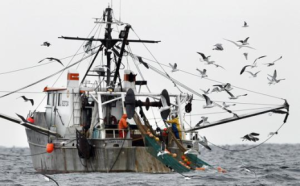
N.H. commercial fishermen balk at new fees for at sea observers
New Hampshire’s commercial fishing industry could vanish soon, industry members said, as the state’s last nine active boat operators face what they call new back-breaking costs imposed by the federal government. Commercial fishermen will meet Monday at 4:30 p.m. with U.S. Rep. Frank Guinta, R-N.H., at Yankee Fisherman’s Cooperative in Seabrook to discuss the new costs, which pay for regulatory observers. , a Hampton-based fisherman, said New Hampshire’s congressional delegation is the industry’s last hope to get federal regulators off its back. Read the rest here 12:31
David Goethel: Fishermen’s anger justified
 Recently, Massachusetts Gov. Charlie Baker called the requirement for fishermen to pay $710 per day for catch monitoring “the most perfect example of an unfunded mandate” and continued on to call the policy “ridiculous” and “outrageous.” As a fisherman with close to 50 years experience in the fishery, I could not agree more but think your readers and editors need more context to understand the fishermen’s anger. Read the rest here 08:41
Recently, Massachusetts Gov. Charlie Baker called the requirement for fishermen to pay $710 per day for catch monitoring “the most perfect example of an unfunded mandate” and continued on to call the policy “ridiculous” and “outrageous.” As a fisherman with close to 50 years experience in the fishery, I could not agree more but think your readers and editors need more context to understand the fishermen’s anger. Read the rest here 08:41
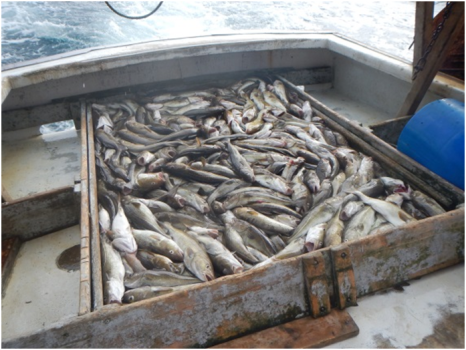
A Tale of two pictures – NOAA and Enviros have it all wrong on Gulf of Maine Cod!
This is a picture of approximately 2000 lbs. of cod. It represents the first time I have targeted cod in two years. While one picture does not determine the status of the stock it is a powerful illustrator of our current assessment shortcomings. This presentation is on Gulf of Maine Cod but the problems it illustrates cut across numerous species. By way of background, this was a one hour research tow in an open area. I travelled 20 miles to make this tow and it represents the first area that had not been taken over by lobster traps. This alone is cause for concern because most of the Gulf of Maine is now defacto closed to commercial fishing and the trawl survey, by the proliferation of fixed gear. The fact is, none of us now know how many cod exist because no one, including the NOAA trawl survey can fish here. Read the rest here, by David Goethel 16:36
Enviros Petition for Immediate and Permanent Rule Making to Prohibit Fishing for Gulf of Maine Cod
Setting the record, and John Bullard straight – Fishermen have first-hand knowledge of cod stock levels
Recently the Portsmouth Herald ran a well written, multiple source article on the status of  . One of your interviews was with John Bullard, Regional Administrator for NOAA Fisheries. In his statement he said he would be glad to consider my point of view when I produced peer-reviewed scientific journal articles. Apparently Mr. Bullard does not know that I have been involved in peer-reviewed journal articles on several species, as well as trawl bycatch reduction devices, for a number of years. Read the rest here 06:53
. One of your interviews was with John Bullard, Regional Administrator for NOAA Fisheries. In his statement he said he would be glad to consider my point of view when I produced peer-reviewed scientific journal articles. Apparently Mr. Bullard does not know that I have been involved in peer-reviewed journal articles on several species, as well as trawl bycatch reduction devices, for a number of years. Read the rest here 06:53
Federal restrictions hit recreational fishermen
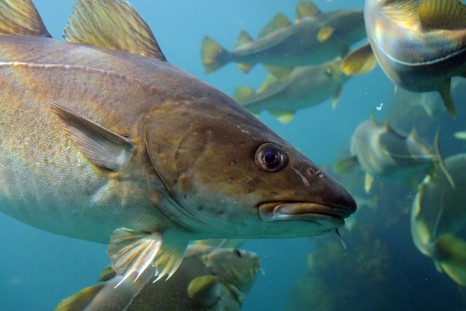 John Bullard, Northeast regional administrator at NOAA, said he believes the scientists working with NOAA and who came to the recent conclusions about cod should be fairly acknowledged by the fishermen. Their studies are peer reviewed, he said, meaning they’ve been examined and approved by scientists familiar with the subject not involved with the study directly. He said he sympathizes with the fishermen and others impacted by the economic hit the regulations are causing, but he believes the restrictions are necessary. Read the rest here 09:34
John Bullard, Northeast regional administrator at NOAA, said he believes the scientists working with NOAA and who came to the recent conclusions about cod should be fairly acknowledged by the fishermen. Their studies are peer reviewed, he said, meaning they’ve been examined and approved by scientists familiar with the subject not involved with the study directly. He said he sympathizes with the fishermen and others impacted by the economic hit the regulations are causing, but he believes the restrictions are necessary. Read the rest here 09:34
UPDATED – New Hampshire’s small commercial fishing fleet is reeling – at odds with NOAA over cod reductions
 “The fishermen vehemently dispute this latest assessment,” said David Goethel, captain of the F/V Ellen Diane out of Hampton Harbor. He’s served on the New England Fisheries Management Council and fished for more than two decades, and said the new measures may put him out of business. “It’s a completely idiotic program,” he said. “It is intended to kill fish and kill fishermen.” Read the rest here 09:09 and On the Seacoast, cod fishing blues read it here 10:23
“The fishermen vehemently dispute this latest assessment,” said David Goethel, captain of the F/V Ellen Diane out of Hampton Harbor. He’s served on the New England Fisheries Management Council and fished for more than two decades, and said the new measures may put him out of business. “It’s a completely idiotic program,” he said. “It is intended to kill fish and kill fishermen.” Read the rest here 09:09 and On the Seacoast, cod fishing blues read it here 10:23
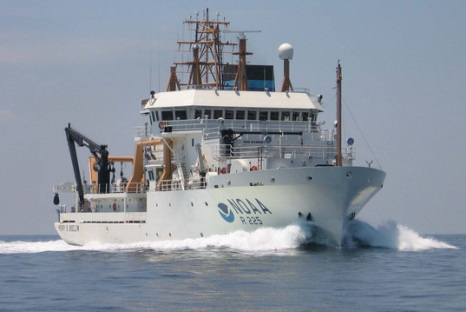
Fishermen Question Cod-Fishing Ban Data -one boat couldn’t catch any cod — and that boat happens to belong to the U.S. government.”
“I am certain that the science is wrong by a lot on this one,” said Vito Giacalone,,, David Goethel, captain of the Ellen Diane out of Hampton, New Hampshire, agreed. “I think there are a lot more cod than they are finding,” Goethel said. “I think we’re in the position we’re in basically because one boat couldn’t catch any cod — and that boat happens to belong to the U.S. government.” Video, and read the rest here 08:53
Gentlemen, I am addressing these comments to you and not the council – David Goethel
 Mr. John Bullard, Dr. Bill Karp, Gene Martin, Esq., Gentlemen, I am addressing these comments to you and not the council because I believe you are the people that have to address the issue. From my perspective, as a scientist, NOAA committed two unpardonable sins with its press release on Gulf of Maine cod on August 1. Science was replaced with advocacy that day when statements were made about the condition of cod, and that immediate action must be taken after a secret, experimental stock status update before peer review. Read the rest here 18:47
Mr. John Bullard, Dr. Bill Karp, Gene Martin, Esq., Gentlemen, I am addressing these comments to you and not the council because I believe you are the people that have to address the issue. From my perspective, as a scientist, NOAA committed two unpardonable sins with its press release on Gulf of Maine cod on August 1. Science was replaced with advocacy that day when statements were made about the condition of cod, and that immediate action must be taken after a secret, experimental stock status update before peer review. Read the rest here 18:47
‘Phantom’ fishing discards seen skewing fish quotas – absurdities which helps explain the poor quality of NOAA fisheries science
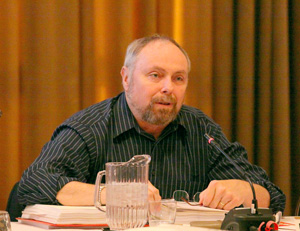 Calculating discards, an essential component in the fishery management system, has evolved into a knot of absurdities which helps explain the poor quality of NOAA fisheries science, says David Goethel, a commercial fisherman and member of the New England Fishery Management Council. Read more
Calculating discards, an essential component in the fishery management system, has evolved into a knot of absurdities which helps explain the poor quality of NOAA fisheries science, says David Goethel, a commercial fisherman and member of the New England Fishery Management Council. Read more






